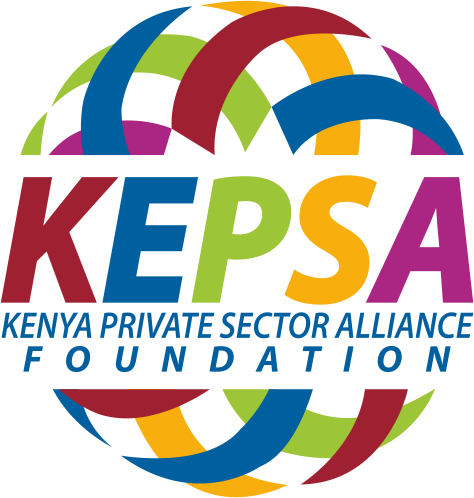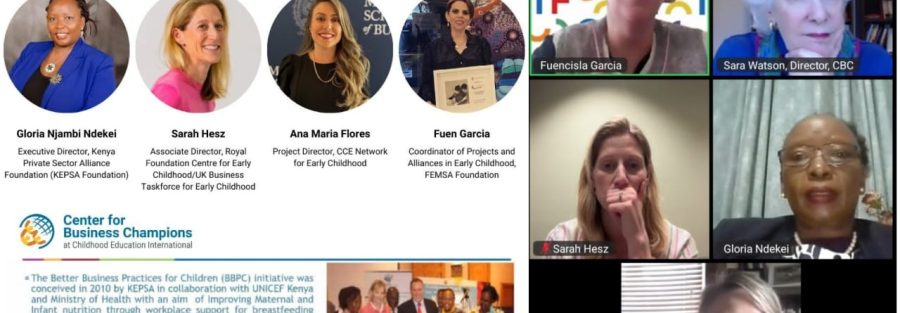On 8th April 2025, KEPSA Foundation Executive Director, Ms, Gloria Ndekei, showcased the Better Business Practices for Children (BBPC) initiative in a panel discussion during the Global Forum on Investing in Early Childhood. The forum organized by the Centre for Business Champions (CBC) convened early childhood experts, practitioners, civil society leaders, business innovators, and policymakers from different countries to explore the economic and social benefits of investing in young children and the powerful role businesses can play in shaping a thriving future for all.
The global platform session that focused on showcasing successful Business-Early Childhood Development (ECD) Partnerships in Action, featured Ms. Ndekei alongside Dr. Sara Watson of Childhood Education International, Ms. Fuencisla Garcia Nuche Rivero from Fundación FEMSA, Ms. Sarah Hesz from The Royal Foundation Centre for Early Childhood, and Ms. Ana Maria Flores from the Centre for Early Childhood Network.
Ms. Ndekei highlighted how the BBPC initiative was conceived in 2010 by KEPSA, UNICEF and the Ministry of Health where 27 companies signed statement of commitment to uphold Child Rights Principles and Better Business Practices for Children. She explained that the initiative has achieved several milestones, including advocating for the enactment of important policies and laws, such as the Breast Milk Substitutes (BMS) Regulations and Control Bill, 2011. This critical legislation prohibits the widespread promotion and advertisement of baby complementary food products to encourage breastfeeding as the preferred method of infant feeding. Additionally, the Health Act 2017 mandates that companies establish lactation stations and provide flexible working arrangements, including nursing breaks. The initiative also focuses on influencing employers to adopt workplace policies and infrastructure that promote, support, protect, and sustain breastfeeding beyond maternity leave.
Ms. Ndekei further emphasized the vital role played by industry leaders and their spouses, who championed the Better Business Practices for Children (BBPC) initiative and set the momentum for its adoption within private sector companies. Their involvement, particularly the inclusion of female CEOs from various organizations, created a strong foundation for the program’s success and expansion.
She highlighted several key achievements of the BBPC initiative, including the development of the inaugural Private Sector Policy to support workplace breastfeeding, which provides guidance for private entities aiming to optimize BBPC. Additionally, Ms. Ndekei noted the documentation of business case studies showcasing employer support for improved breastfeeding practices, the establishment of a model lactation room at KEPSA offices that also served as a learning centre for other companies, and the sensitization of over 1,000 private sector companies. As a result of the advocacy efforts, more than 100 private sector companies established lactation stations, with many others at various stages of implementation.
In her closing remarks, Ms. Ndekei called for an expansion of advocacy efforts among managers to emphasize how BBPC in the workplace enhances employee performance. She also noted that the introduction of new building codes to mandate creation of mother- and child-friendly spaces in new buildings would go a long way in supporting childhood development. Additionally, she advocated for the creation of child-friendly infrastructure and practices in the informal sector, as well as the implementation of the Hybrid Chama Program to support child-friendly practices. Furthermore, Ms. Ndekei stressed the importance of supporting income-generating activities to improve family livelihoods, highlighting the central role women play in determining household nutrition. She emphasized that focusing on women’s empowerment is crucial, not only for improving family well-being but also as a strategy to enhance long-term workforce outcomes.
Ms. Sarah Hesz highlighted the role of The Royal Foundation Centre for Early Childhood, led by the Princess of Wales, in encouraging families and communities to get creative in childhood development. She noted how the Foundation brings together like-minded partners to influence businesses by championing simple tangible actions for holistic approach, with eight companies already on board in the initiative.
Ms. Ana Flores and Ms. Fuencisla Garcia highlighted on advocacy and awareness raising for corporations in Mexico to implement business opportunities that support childcare practices. They shared initiatives such as breastfeeding rooms, extended maternity leaves, and flexible working arrangements as key examples. They also pointed out that the network has grown significantly, expanding from 21 companies to 71. They are also championing companies to invest in rural communities to support early childhood development, including targeting the Small and Medium Enterprises.
Dr. Sara Watson on her part provided insights on how to effectively approach and influence businesses to join such networks including targeting the SMEs, by starting with creating a business case to anchor a framework for action, including opportunities for supporting early childhood and caregivers in securing business essentials.





